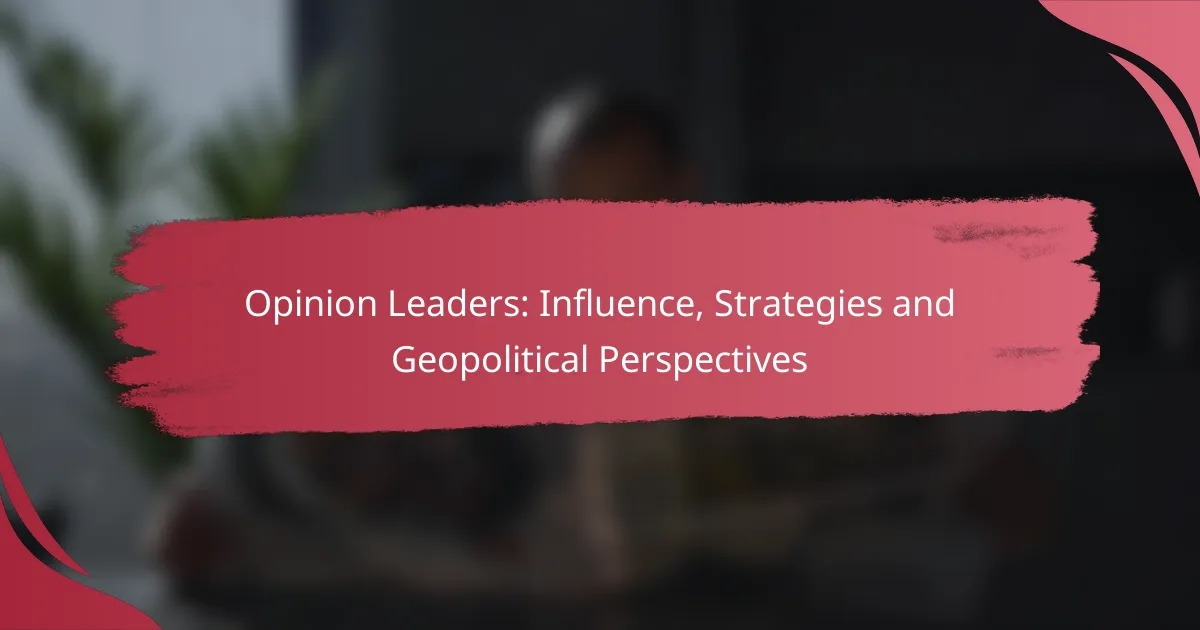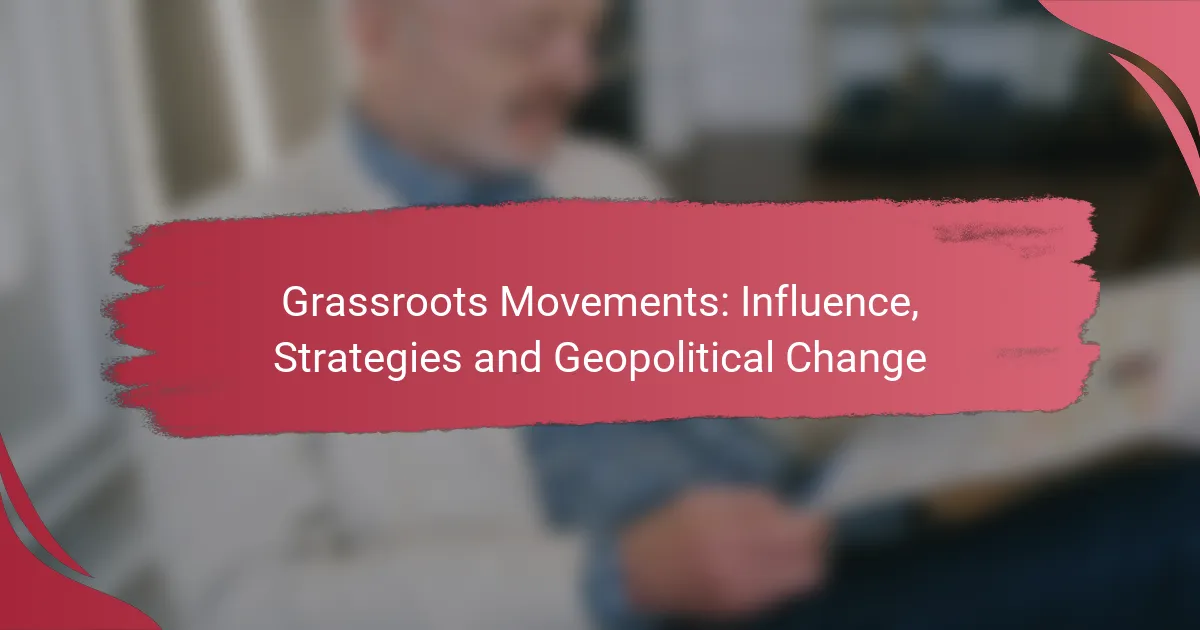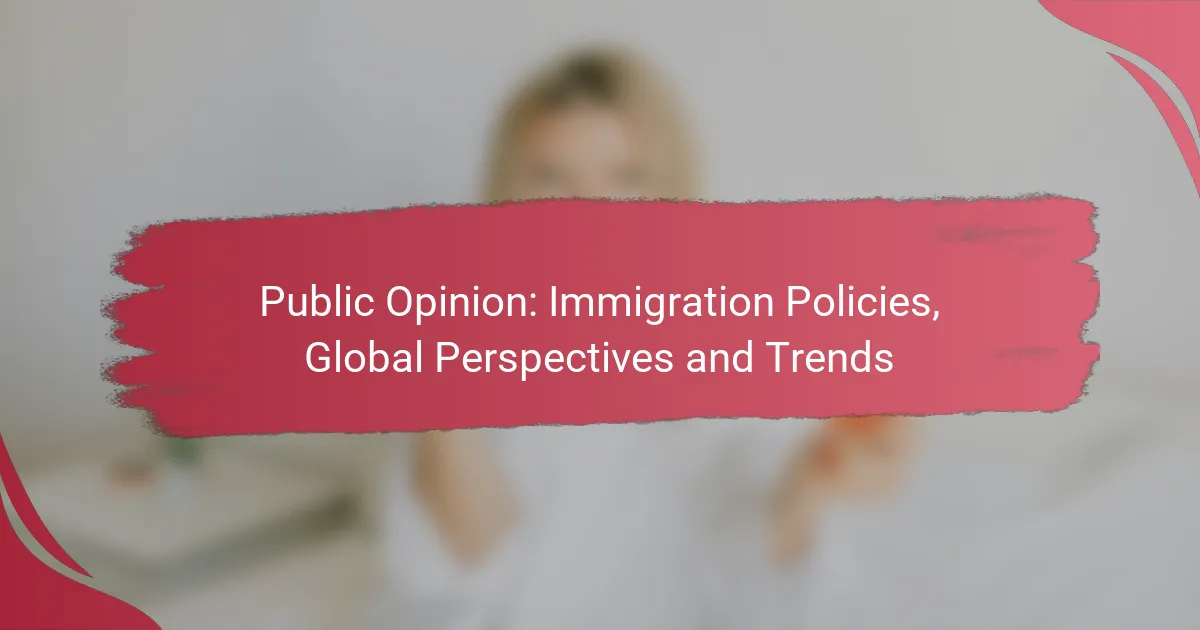Opinion leaders play a crucial role in shaping public perception and influencing societal behaviors through their established credibility and extensive reach. By employing diverse strategies such as content creation and networking, they effectively communicate their perspectives, particularly in geopolitical contexts where their influence can significantly impact public opinion and policy decisions.
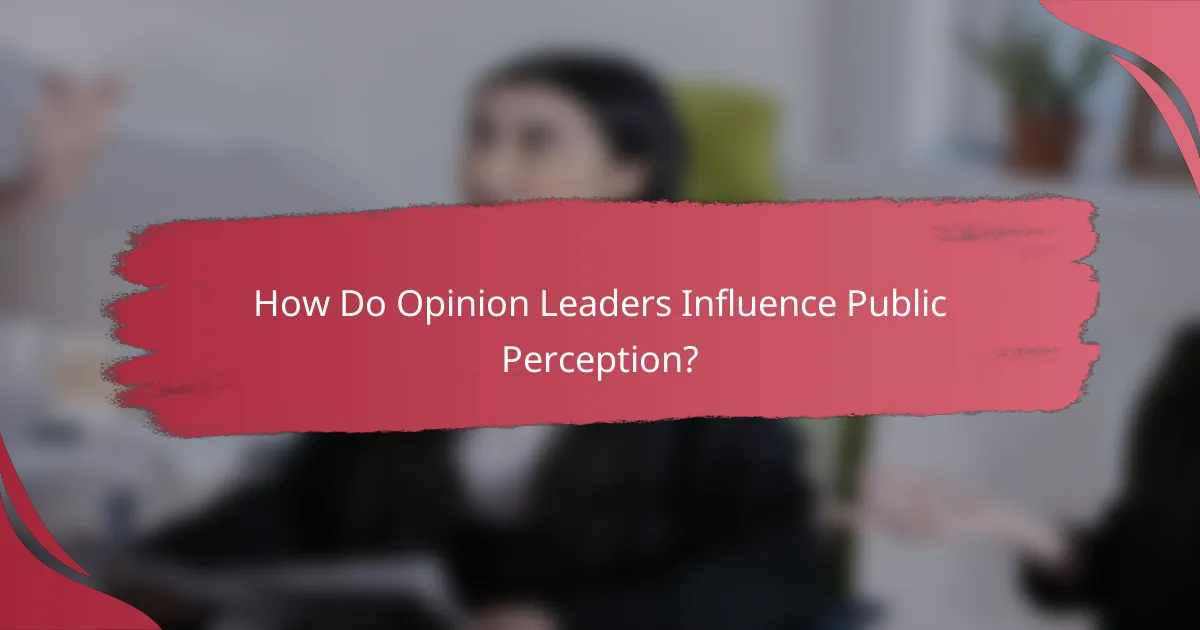
How Do Opinion Leaders Influence Public Perception?
Opinion leaders significantly shape public perception through their credibility and reach. They leverage various platforms and strategies to communicate their views, which can sway the opinions and behaviors of their audience.
Social media engagement
Social media is a powerful tool for opinion leaders, allowing them to connect directly with large audiences. By sharing insights, articles, and personal opinions, they can rapidly influence public sentiment. Platforms like Twitter, Instagram, and Facebook enable them to engage in real-time discussions, amplifying their reach.
To maximize impact, opinion leaders should focus on creating authentic content that resonates with their followers. Regular interaction, such as responding to comments and participating in trending conversations, helps maintain visibility and credibility.
Expert endorsements
Expert endorsements can significantly enhance the influence of opinion leaders. When a respected figure supports a cause or product, their followers are more likely to trust the message. This can be particularly effective in fields like health, technology, and politics, where expertise is valued.
Opinion leaders should seek partnerships with credible experts to bolster their messages. Highlighting these endorsements in campaigns can create a stronger narrative and encourage public acceptance. For instance, a well-known scientist endorsing a new health initiative can sway public opinion more effectively than a celebrity endorsement.
Public speaking events
Public speaking events provide opinion leaders with a platform to share their views and engage directly with audiences. These events can range from conferences to community forums, allowing leaders to present their ideas in a compelling manner. The personal connection established during these interactions can enhance their influence.
To make the most of public speaking opportunities, opinion leaders should prepare engaging presentations that include storytelling and data to support their arguments. Networking during these events can also lead to new collaborations and increased visibility within their field.
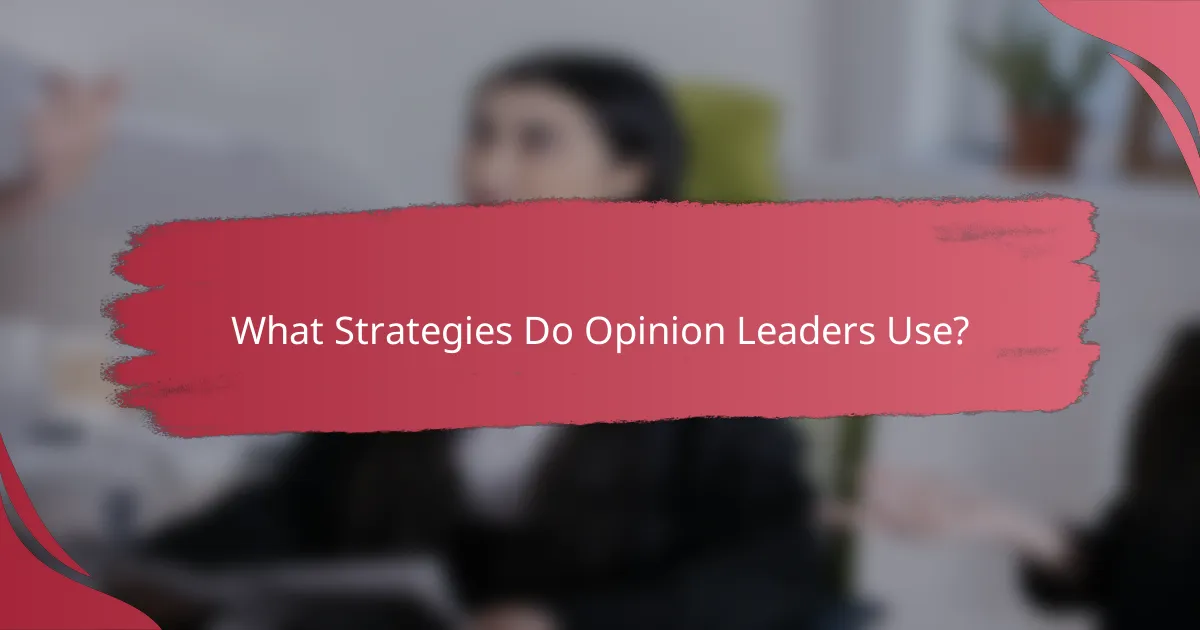
What Strategies Do Opinion Leaders Use?
Opinion leaders utilize various strategies to influence their audience effectively. These strategies include content creation, networking, collaboration, and leveraging data-driven insights to enhance their credibility and reach.
Content creation
Content creation is a fundamental strategy for opinion leaders, as it allows them to share their insights and perspectives with a wider audience. This can include articles, videos, podcasts, or social media posts that resonate with their followers. High-quality, engaging content is crucial for establishing authority and attracting attention.
To maximize impact, opinion leaders should focus on topics that align with their expertise and audience interests. Regularly updating content and utilizing various formats can help maintain engagement. For instance, a weekly blog post combined with daily social media updates can keep followers informed and invested.
Networking and collaboration
Networking and collaboration are essential for opinion leaders to expand their influence and reach. Building relationships with other influential figures, brands, or organizations can lead to mutually beneficial partnerships, amplifying their message and audience. Attending industry events, conferences, or online forums can facilitate these connections.
Collaborative projects, such as joint webinars or co-authored articles, can enhance credibility and introduce opinion leaders to new audiences. It’s important to choose partners whose values align with their own to maintain authenticity and trust with their followers.
Data-driven insights
Utilizing data-driven insights allows opinion leaders to make informed decisions and tailor their strategies effectively. Analyzing audience demographics, engagement metrics, and content performance helps them understand what resonates best with their followers. Tools like Google Analytics or social media insights can provide valuable information.
Opinion leaders should regularly review this data to adapt their content and engagement strategies accordingly. For example, if a particular topic generates significantly higher engagement, they might consider producing more content around that subject. This approach ensures that their influence remains relevant and impactful.
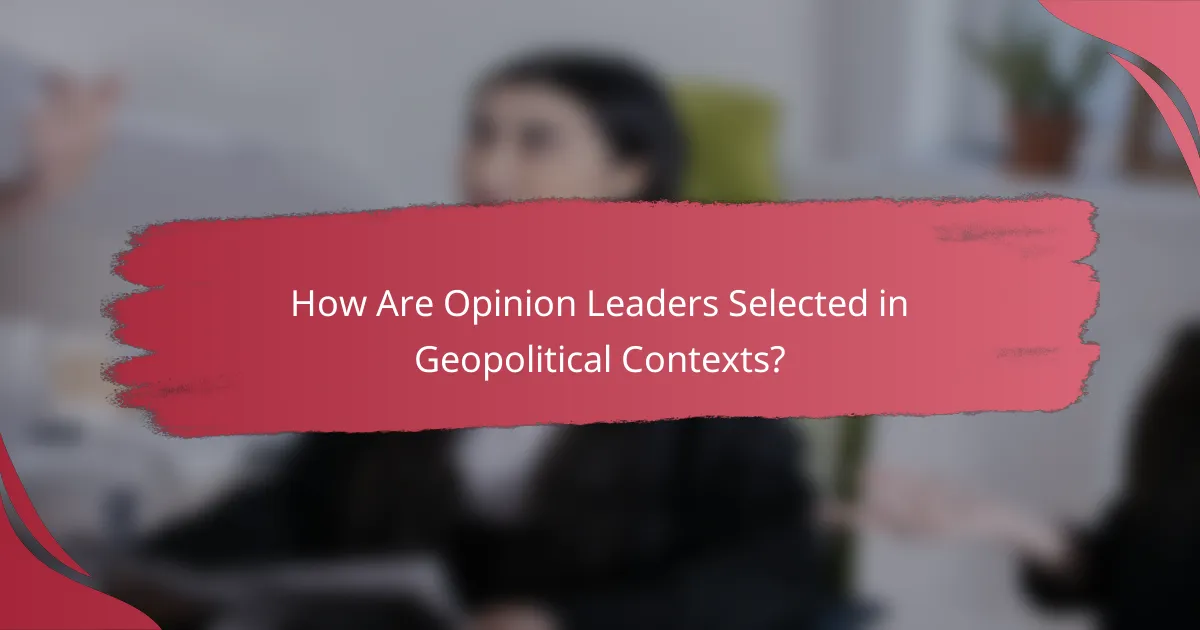
How Are Opinion Leaders Selected in Geopolitical Contexts?
Opinion leaders in geopolitical contexts are typically selected based on their influence, reputation, and the demographics of their audience. These factors help determine their ability to shape public opinion and policy decisions within specific regions or on global issues.
Influence metrics
Influence metrics assess the reach and impact of opinion leaders through various quantitative measures. Common metrics include social media engagement rates, the number of followers, and the frequency of mentions in media outlets. For example, an opinion leader with millions of followers and high engagement rates is often considered more influential than one with a smaller audience.
Additionally, qualitative metrics such as the sentiment of audience interactions can provide insights into the leader’s effectiveness. Tools like social listening platforms can help track these metrics and gauge the leader’s overall influence in geopolitical discussions.
Reputation analysis
Reputation analysis involves evaluating the credibility and trustworthiness of opinion leaders. This can be done through surveys, media coverage, and historical performance in influencing public opinion. Leaders with a strong reputation are often more effective in swaying audiences and policymakers.
It is essential to consider the context in which these leaders operate. For instance, a leader respected in one country may not hold the same status in another due to cultural or political differences. Therefore, understanding local perceptions is crucial for accurate reputation analysis.
Audience demographics
Audience demographics play a vital role in selecting opinion leaders, as they determine who the leader can effectively influence. Key demographic factors include age, education level, geographic location, and political affiliation. For instance, a leader who resonates with younger audiences may focus on social media platforms, while one targeting older demographics might utilize traditional media.
Analyzing audience demographics helps in tailoring messages that align with the values and concerns of specific groups. This targeted approach can enhance the leader’s impact and ensure that their influence is both relevant and effective in the geopolitical landscape.

What Role Do Opinion Leaders Play in Political Campaigns?
Opinion leaders significantly influence political campaigns by shaping public perceptions and guiding voter behavior. They leverage their credibility and networks to mobilize support, amplify messages, and build trust among constituents.
Voter mobilization
Opinion leaders play a crucial role in voter mobilization by encouraging their followers to participate in elections. They often use social media platforms to share information about registration deadlines, polling locations, and voting procedures, making it easier for people to engage in the electoral process.
Effective mobilization strategies can include organizing community events, phone banking, or door-to-door canvassing. Opinion leaders can also tap into their networks to create a sense of urgency, motivating individuals to vote by emphasizing the importance of their participation.
Message amplification
Message amplification involves opinion leaders disseminating campaign messages to a broader audience. They can enhance the reach of political communications by sharing content on social media, participating in interviews, or writing articles that resonate with their followers.
To maximize impact, campaigns should provide opinion leaders with clear, concise messages that align with their values and interests. This alignment ensures that the amplified messages feel authentic and are more likely to be embraced by the audience.
Trust building
Trust building is essential in political campaigns, and opinion leaders serve as credible sources of information. Their established relationships with followers allow them to convey messages that resonate more deeply than traditional campaign communications.
To foster trust, campaigns should engage opinion leaders in meaningful ways, such as involving them in policy discussions or inviting them to participate in campaign events. This collaboration can enhance the perceived authenticity of the campaign and strengthen the connection between the leader and their audience.
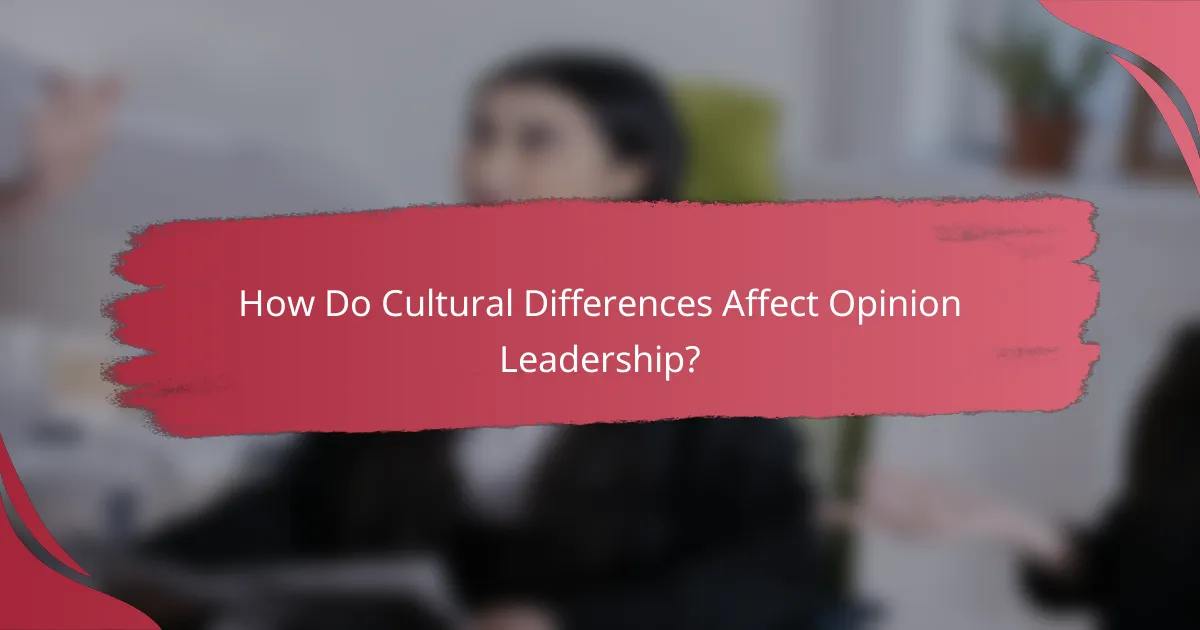
How Do Cultural Differences Affect Opinion Leadership?
Cultural differences significantly influence opinion leadership by shaping how leaders communicate and connect with their audiences. Understanding these variations is essential for effectively engaging with diverse groups and maximizing influence.
Regional communication styles
Communication styles vary widely across regions, affecting how opinion leaders convey messages. For instance, in high-context cultures like Japan, non-verbal cues and implicit messages are crucial, while low-context cultures such as the United States prioritize directness and clarity.
Leaders must adapt their strategies accordingly. In regions where indirect communication is valued, using subtlety and nuance can enhance credibility, whereas in more direct cultures, straightforward messaging is often more effective.
Local vs. global influence
Local opinion leaders often have a deeper understanding of cultural nuances and community needs, which can enhance their influence within specific regions. In contrast, global leaders may focus on broader themes that resonate across multiple cultures, but they risk losing the local touch.
To balance local and global influence, leaders should tailor their messages to reflect local values while maintaining a consistent overarching narrative. This approach helps in building trust and relatability, which are essential for effective opinion leadership.
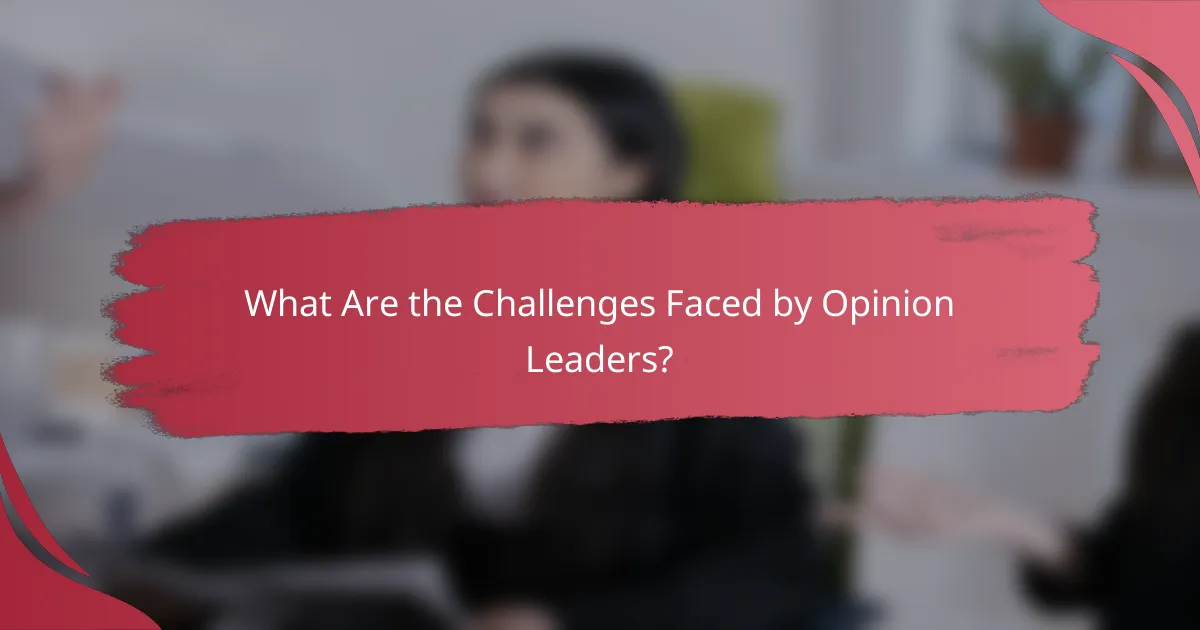
What Are the Challenges Faced by Opinion Leaders?
Opinion leaders encounter various challenges that can impact their influence and effectiveness. These challenges include maintaining credibility, managing public perception, and navigating complex geopolitical landscapes.
Maintaining Credibility
Credibility is crucial for opinion leaders, as it directly affects their ability to influence others. They must consistently provide accurate information and demonstrate expertise in their field. Failing to do so can lead to a loss of trust among their audience.
To maintain credibility, opinion leaders should engage in continuous learning and stay updated on relevant topics. They can also enhance their reputation by collaborating with reputable organizations or experts, which can lend additional authority to their viewpoints.
Managing Public Perception
Public perception can be a double-edged sword for opinion leaders. Positive perception can amplify their influence, while negative perceptions can diminish their reach. They must actively manage their image through strategic communication and engagement with their audience.
Utilizing social media effectively is essential for shaping public perception. Opinion leaders should be transparent in their communications and respond promptly to criticism or misinformation. This proactive approach can help build a loyal following and mitigate potential backlash.
Navigating Geopolitical Landscapes
Geopolitical factors significantly influence the challenges faced by opinion leaders, especially those operating on an international scale. They must be aware of cultural sensitivities, political climates, and regulatory environments in different regions.
To navigate these complexities, opinion leaders should conduct thorough research on the geopolitical context of their audience. Tailoring their messages to align with local values and norms can enhance their effectiveness and ensure that their influence is both relevant and respectful.
